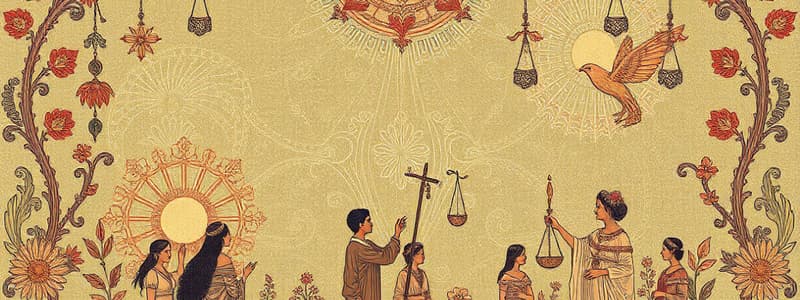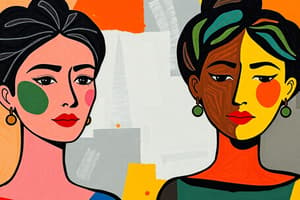Podcast
Questions and Answers
What is taking action to support or make a change for a political or social cause called?
What is taking action to support or make a change for a political or social cause called?
Activism
What is speaking or acting in support of a cause or idea called?
What is speaking or acting in support of a cause or idea called?
Advocacy
What is working with others to support and stand up for groups facing unfair treatment called?
What is working with others to support and stand up for groups facing unfair treatment called?
Allyship
What is treating someone unfairly because of their race, age, and gender called?
What is treating someone unfairly because of their race, age, and gender called?
What is understanding and sharing someone else's feelings called?
What is understanding and sharing someone else's feelings called?
What is making sure everyone gets what they need to be successful or treated fairly called?
What is making sure everyone gets what they need to be successful or treated fairly called?
When people, ideas, and businesses from different parts of the world are connected and affect each other, what is this known as?
When people, ideas, and businesses from different parts of the world are connected and affect each other, what is this known as?
What is the assumption that all people are heterosexual and that there are specific gendered behaviors for boys and girls that are considered 'normal' called?
What is the assumption that all people are heterosexual and that there are specific gendered behaviors for boys and girls that are considered 'normal' called?
What are the basic freedoms and rights that belong to all people, like safety, education, and freedom of speech called?
What are the basic freedoms and rights that belong to all people, like safety, education, and freedom of speech called?
What is a situation where people don't have the same rights or opportunities called?
What is a situation where people don't have the same rights or opportunities called?
What is how different parts of a person's identity (like race, gender, and class) combine to shape their experiences called?
What is how different parts of a person's identity (like race, gender, and class) combine to shape their experiences called?
What is treating people fairly and making sure rules are fair for everyone called?
What is treating people fairly and making sure rules are fair for everyone called?
What is ignoring or leaving out people or groups, making them feel unimportant called?
What is ignoring or leaving out people or groups, making them feel unimportant called?
What is it called when a group is treated unfairly or cruelly for a long time?
What is it called when a group is treated unfairly or cruelly for a long time?
What is having advantages or opportunities that others might not have, often without realizing it called?
What is having advantages or opportunities that others might not have, often without realizing it called?
What is judging someone unfairly before getting to know them called?
What is judging someone unfairly before getting to know them called?
What do you call a person who leaves their home country to escape danger, like war or natural disasters?
What do you call a person who leaves their home country to escape danger, like war or natural disasters?
What is an idea or belief that people in a society create and accept, like rules about gender roles called?
What is an idea or belief that people in a society create and accept, like rules about gender roles called?
What is working to make sure all people are treated fairly and have the same opportunities called?
What is working to make sure all people are treated fairly and have the same opportunities called?
What is standing together with others to support a shared cause called?
What is standing together with others to support a shared cause called?
What is a belief about a group of people that isn't always true called?
What is a belief about a group of people that isn't always true called?
What is a negative or unfair opinion about someone because of a certain trait or condition called?
What is a negative or unfair opinion about someone because of a certain trait or condition called?
What is taking care of resources so that they last for a long time and don't harm the planet called?
What is taking care of resources so that they last for a long time and don't harm the planet called?
What describes something that affects an entire system, like a school or society, not just individuals?
What describes something that affects an entire system, like a school or society, not just individuals?
Flashcards
Activism
Activism
Taking action for a political or social cause.
Advocacy
Advocacy
Speaking or acting in support of a cause or idea.
Allyship
Allyship
Supporting groups facing unfair treatment.
Discrimination
Discrimination
Signup and view all the flashcards
Empathy
Empathy
Signup and view all the flashcards
Equity
Equity
Signup and view all the flashcards
Globalization
Globalization
Signup and view all the flashcards
Heteronormativity
Heteronormativity
Signup and view all the flashcards
Human Rights
Human Rights
Signup and view all the flashcards
Inequality
Inequality
Signup and view all the flashcards
Intersectionality
Intersectionality
Signup and view all the flashcards
Justice
Justice
Signup and view all the flashcards
Marginalization
Marginalization
Signup and view all the flashcards
Oppression
Oppression
Signup and view all the flashcards
Privilege
Privilege
Signup and view all the flashcards
Prejudice
Prejudice
Signup and view all the flashcards
Refugee
Refugee
Signup and view all the flashcards
Social Construct
Social Construct
Signup and view all the flashcards
Social Justice
Social Justice
Signup and view all the flashcards
Solidarity
Solidarity
Signup and view all the flashcards
Stereotype
Stereotype
Signup and view all the flashcards
Stigma
Stigma
Signup and view all the flashcards
Sustainability
Sustainability
Signup and view all the flashcards
Systemic
Systemic
Signup and view all the flashcards
Study Notes
- These are definitions of terms related to social issues.
Activism
- Taking action to support or make a change for a political or social cause constitutes activism.
Advocacy
- Speaking or acting in support of a cause or idea is known as advocacy.
Allyship
- Allyship involves working with others to support and stand up for groups facing unfair treatment.
Discrimination
- Treating someone unfairly because of their race, age, gender, or other differences is discrimination.
Empathy
- Empathy is understanding and sharing someone else's feelings.
Equity
- Ensuring everyone gets what they need to be successful or treated fairly is the goal of equity.
Globalization
- Globalization refers to how people, ideas, and businesses from different parts of the world are connected and affect each other.
Heteronormativity
- The assumption that all people are heterosexual and that there are specific gendered behaviors for boys and girls, that are considered 'normal' is heteronormativity.
Human Rights
- Basic freedoms and rights that belong to all people, such as safety, education, and freedom of speech, known as human rights.
Inequality
- A situation where people don't have the same rights or opportunities signifies inequality.
Intersectionality
- How different parts of a person's identity (like race, gender, and class) combine to shape their experiences defines intersectionality.
Justice
- Treating people fairly and ensuring rules are fair for everyone is considered justice.
Marginalization
- Ignoring or leaving out people or groups, making them feel unimportant, leads to marginalization.
Oppression
- When a group is treated unfairly or cruelly for a long time, it is termed oppression.
Privilege
- Privilege means having advantages or opportunities that others might not have, often without realizing it.
Prejudice
- Judging someone unfairly before getting to know them constitutes prejudice.
Refugee
- A person who leaves their home country to escape danger, like war or natural disasters, is a refugee.
Social Construct
- An idea or belief that people in a society create and accept, like rules about gender roles, is a social construct.
Social Justice
- Social justice involves working to make sure all people are treated fairly and have the same opportunities.
Solidarity
- Standing together with others to support a shared cause defines solidarity.
Stereotype
- A belief about a group of people that isn't always true is a stereotype.
Stigma
- A negative or unfair opinion about someone because of a certain trait or condition creates stigma.
Sustainability
- Sustainability means taking care of resources so that they last for a long time and don't harm the planet.
Systemic
- Systemic describes something that affects an entire system, like a school or society, rather than just individuals.
Studying That Suits You
Use AI to generate personalized quizzes and flashcards to suit your learning preferences.





